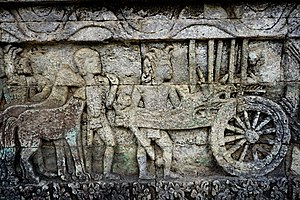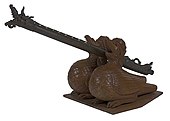Karambalangan

Karambalangan is a type of personal armor from Java. It is a metal coating worn in front of the chest or breastplate.[1]: 320 [2]: 802
History
[edit]The Kakawin Ramayana (c. 870 AD), which is the Javanese version of Valmiki's epic Ramayana (c. 500 BC), mentions clothing and armor that reflect the era. A member of the royal family is said to wear crown, padaka (collar, medallion, or breastplate), karambalangan (girdle or plastron) and use gold-plated armor even in battle.[2]: 802 [3]: 27
Karambalangan was recorded in the Kidung Panji Wijayakrama-Rangga Lawe (written as early as 1334 AD),[4]: 56 which mentioned that Rangga Lawe wore karambalangan manik (jeweled karambalangan) when he rebelled against Majapahit (1295 AD).[5]: 187 Emperor Raden Wijaya in that kidung was recorded using golden karambalangan manik.[5]: 105
In the Kidung Sundayana, it is written that Gajah Mada before the Bubat tragedy wore a karambalangan (a metal plate on the front of the chest—breastplate) decorated with gold emboss, armed with a gold-plated spear, and a shield decorated with diamonds.[6][7]

See also
[edit]References
[edit]- ^ Nugroho, Irawan Djoko (2011). Majapahit Peradaban Maritim. Suluh Nuswantara Bakti. ISBN 978-602-9346-00-8.
- ^ a b Zoetmulder, P. J. (1982). Old Javanese-English dictionary. The Hague: Martinus Nijhoff. ISBN 9024761786.
- ^ Tjoa-Bonatz, Mai Lin (2019). "JAVA : ARTS AND REPRESENTATIONS. Art historical and Archaeometric Analyses of Ancient Jewellery (7–16th C.) : The Prillwitz Collection of Javanese Gold". Archipel (97): 19–68.
- ^ Damais, Louis-Charles (1958). "I. Études d'épigraphie indonésienne : V. Dates de manuscrits et documents divers de Java, Bali et Lombok" Bulletin de l'École Française d'Extrême-Orient. Tome 49, pp. 1-257.
- ^ a b Berg, C.C. (1930). Rangga Lawe: Middeljavaansche Historische Roman: Critisch uitgegeven. Batavia: Kon. Bataviaasch Genootschap van Kunsten en Wetenschappen (Bibliotheca Javanica, 1).
- ^ Berg, Kindung Sundāyana (Kidung Sunda C), Soerakarta, Drukkerij “De Bliksem”, 1928.
- ^ Nugroho, Irawan Djoko (6 August 2018). "Baju Baja Emas Gajah Mada". Nusantara Review. Retrieved 14 August 2019.



